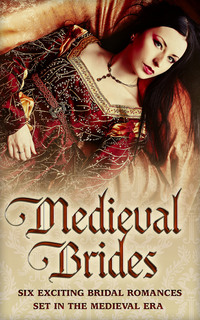Kitap dosya olarak indirilemez ancak uygulamamız üzerinden veya online olarak web sitemizden okunabilir.
Kitabı oku: «Medieval Brides», sayfa 9
Chapter Ten
He caught up with the little novice before he had worked out what he was going to say to her. There was a flash of blue ahead of him—his cloak—moving swiftly along the path through the cemetery. At least she is not running off, like her sister, he thought, and some of the tension he had been carrying fell away. He did not want to lose her.
Hell, that was not right. He did not want to lose the chance of using her. Give her some rope and she would help flush out resistance to Duke William’s rule. Yes, that was it: he was planning to use her…
Adam shook his head at the chaos an innocent-looking face was bringing to his normally orderly mind, and began closing the distance between them. That hideous veil was lost beneath the hood of his cloak. A strategist by nature, Adam fought to compose his thoughts. He misliked entering a field of battle in disarray.
Was that was this was? A battle? Damn it, a couple of hours ago he had woken with the girl in his arms, soft and pliant from sleep. Her morning kisses had tasted of welcome; they had seemed to hint that they might deal well together, had seemed to promise affection, if not love itself, given time. Hah! The little novice might well have been moved by love this morning, when she had visited the goldsmith’s house, but it was not love for him. No. He must strive to remember that.
But, with his eyes fixed on that diminutive cloaked figure, his thoughts refused to get back into line. The touch of her…the smell of her…somehow she had driven out his longing for Gwenn. Temporarily, of course, but it had been a first to awaken and not ache for Gwenn. That should have alerted him. The little novice was not as harmless as she appeared. He was treading on treacherous ground.
His lips curved into a self-deprecating smile. Wonderful. He had no clear strategy; he did not have the lie of the land; he was about to engage with the enemy. Bloody wonderful.
Cursing himself for the worst kind of fool, Adam stared at that slender back and narrowed the distance between them. If only he could read minds. She was hoping, no doubt, that her visit to Golde Street had gone unobserved. Gritting his teeth, ignoring a bitter taste in his mouth, he waved his captain on with a muttered, ‘Look to the horses, man, and get the troop in order. We’re leaving for Fulford in half an hour.’
‘Yes, sir.’
He strode up to the little novice and caught her by the shoulder. ‘Lady Cecily?’
‘Sir Adam!’ She practically leapt out of her skin. ‘I…I was just wondering where you were.’
I’ll bet you were, Adam thought, missing neither the nervous smile nor the guilty flush. For his part, he was wondering what lies she would feed him. ‘Where have you been?’
‘I…I…thought I would take a look round the town. It’s been so long since I was last here.’
Taking her hand, placing it carefully on his arm, he urged her towards the garrison. ‘Where is Maurice? He should have escorted you.’
Her eyes were wide, her expression earnest. ‘I did not think I would go far,’ she said. ‘I told him I was only going to the Cathedral, but then I…I thought I would like to see the convent at Nunnaminster.’
Liar, liar, Adam thought, fighting to school his expression to one of polite interest. ‘What was it like?’
‘The nunnery?’
‘What else?’ A tendril of hair was curling out under the edge of her wimple, gleaming gold in the sun. He tore his gaze away and reminded himself of what he must do. Nothing. He must do nothing because this was a waiting game. Give her some rope and see what she does with it.
It would be easier, cleaner, quicker—an end to this torment, this polite fencing that left so much unsaid—to shake the truth out of her once and for all. He grimaced. Direct confrontation might put an end to the ache that was not knowing whether he could trust her or not, but it would not advance Duke William’s cause. No, he must play the waiting game. It should not be hard. A pretty Saxon face and a soft, warm body would not distract him from his duty to his lord.
‘I…I could not find the convent,’ she was saying. ‘I l-lost my way at the top of Market Street and came straight back.’
She was the most terrible liar. No, it was more than just that. She did not like lying to him. Unaccountably Adam’s heart lifted. Nodding at her almost cheerfully, he covered her hand with his and they proceeded towards the Old Palace, outwardly a Breton knight, with his lady at his side. And inwardly? Her fingers were trembling under his and she would not meet his gaze. Adam might be deluding himself, but he did not consider that all was lost if she disliked feeding him lies.
Adam had borrowed a horse from the garrison for Cecily to ride home. It was a wreck rather than a horse. Gripping the reins, Cecily glared at the back of the animal’s head and, using her heels, tried vainly to urge it into a trot. She was riding astride, no ladies’ saddle being available at the Palace stables, and today that was a blessing. Had she been riding sidesaddle she doubted she would have been able to get the wreck to do more than shuffle, and she was lagging behind as it was. Astride, there was some measure of control, or so she liked to imagine. The wreck was spavined and flea-bitten—not fit even to be a packhorse.
Struggling with her mount left Cecily with no energy to worry about displaying darned stockings or watching their route. It left her with little energy for worrying about the disturbing conversation she had had with Adam outside the Palace walls. She could not put her finger on why the conversation had disturbed her, but she could not set it behind her. Nothing overt had been said, and yet dark undertones had been present. Of course she did not know Adam Wymark well enough to know his every mood. He might have a nature as volatile as her father’s, but she did not think so. Outside the Palace she had sensed…she had sensed…
Had Adam found out about her visit to Leofwine’s house? It was certainly possible, but he had not said as much. Throughout his manner had been polite, watchful—yes, very watchful—and ever so slightly off. He must know more than he was saying.
She glanced over the ears of the wreck she was riding. She had no idea how far they had gone. Apart from Maurice, who rode silently at her side, everyone else in Adam’s troop, including Adam himself, was several hundred yards in front of them. Sighing, Cecily reapplied her heels to the wreck’s ribs.
The road was bordered by spindly hawthorn bushes that were peppered with berries. Old man’s beard snarled in the leafless branches of blackthorn bushes and tangled in thin, red-stemmed dogwoods.
As their party rounded the next turn they came to a crossroads, where the way was scarred with deep ruts, white with the chalk that told her they were nearing the downlands—sheep-farming country. In the summer the downs were a haze of bees and blue butterflies, and as for the skylarks…But this was November, Cecily reminded herself. The downs would be quiet. There would be no skylarks spiralling in the heavens—the downs would be resting, like the convent herb garden.
They passed a moss-covered milestone with the name ‘Fulford’ carved deep into its surface and she realised with a jolt that they were almost home.
Home. Perhaps it had been a mercy that for the past few miles her mind had been occupied, for now they were almost there her stomach began to churn. What would she find at Fulford? Was there anyone left who would recognise her? Would she be able to keep her brother safe?
Cecily dug in her heels and the horse’s ears flickered, but the beast must have a hide of iron and the will of a mule, for its pace was unalterable. Slow, slow, slow.
Ahead of them, Adam shoved his cloak back over one shoulder and leaned a hand on the cantle of his saddle. ‘Maurice, take Lady Cecily’s reins, will you? She’s obviously in difficulties, and it’s dangerous to be strung out along the road like this.’
Without waiting for any response, he about-faced, pulling his cloak back into place.
Since returning with her to the Palace, the man she had agreed to marry had not spared her so much as a glance. He must know about her visit to Golde Street. The warm, considerate, handsome man who had kissed her that morning had been transformed into a harsh, glacial-eyed warrior. Were they one and the same person? First thing this morning Adam had seemed kind—almost sweet, if a man could be sweet. But after she had returned to the Old Palace he had been cold and distant. Unapproachable.
And now he was bent on humiliating her in front of his squire. She huffed out a breath. She was not in difficulties. It was the pitiful shambles of a horse she’d been given. Poor bony nag, it could barely stand. Her father would never have mounted her on such a beast; he would have deemed it only fit for dog meat.
Maurice reached down and took her reins.
‘It’s not me,’ Cecily muttered, glaring at Adam’s broad back.
Maurice urged his own destrier on, and its sheer size and strength forced the wreck to keep up. ‘I know,’ Maurice said. Behind the nose-guard of his helm, his dark eyes were smiling. ‘And so does Sir Adam.’
‘Then why did he choose such a horse for me?’
‘Sir Adam was lucky to get a horse at all. It was the last in the stables.’
‘The last? I wonder why? I should have thought the Duke’s men would have fought to the death over it.’
‘Quite so, my lady.’ Maurice’s lips twitched. ‘But it must be better than sharing Sir Adam’s.’
‘Oh, yes, Maurice. At least I’ve been spared that.’
Trotting along with Maurice, several yards behind Flame, Cecily ignored the sharp look that Adam’s squire gave her and concentrated instead on keeping the horse moving.
The Wessex countryside slid by, becoming more and more familiar with every step. The road ran up a rise and down the other side, beginning a gentle descent into a lightly wooded valley that sliced a long bite out of the downland. Flocks of sheep moved placidly over the downs, and below, on the floor of the valley, the River Fulford flowed slowly on. It would eventually reach the Narrow Sea. Generations of Cecily’s family had lived near the River Fulford. Its waters had ground their corn, kept their fish fresh in the fish pond, helped them grow cress…
In no time Cecily was looking at strips of farmland that had been cut out of the woodland. Ahead, Adam reined in, and allowed them to draw level with him.
‘Familiar, my lady?’ Maurice asked.
‘Aye. Fulford Hall.’ She cleared her throat. ‘It’s very close.’
‘I’ll take it from here, Maurice,’ Adam said, taking her reins from his squire. He pulled off his helm, looped the strap round the pommel of his saddle and pushed back his coif. ‘See to the horses, will you?’
‘Aye, sir.’ Maurice spurred on ahead.
Adam’s profile was stern. And then he looked at her and smiled. But it seemed Cecily was getting to know him. His smile was false.
‘Sir?’
‘Be my guide, will you? When we took possession we were hard pushed to make out a word that was said to us, and I would know the name and station of everyone on this holding—down to the last soul. You swore to be my guide, remember? And I want you to teach me English.’
When we took possession. Cecily swallowed and nodded, lowering her gaze to hide a flash of anger. She did not know what she had expected to feel at her homecoming, but she had not thought to feel anger. Could he not allow her a few moments to come to terms with the changes—parents and brother gone, sister fled? Callous, cold, insensitive brute.
But then, surprisingly, anger was pushed aside, for their horses were walking past the peasants’ field strips on the outskirts of Fulford village, and there was too much she wanted to see.
The woods had been cut back in the four years she had been away, and two whole new fields had been made. Each peasant’s strip was clearly marked out from his neighbours—ridge, furrow, ridge, furrow, ridge, furrow. As expected, the wheat field had been harvested, and several pigs were tethered there, rooting about in the stubble, digging, manuring, turning all to mud. The fallow field had turned into a sheep-pen, and the frost-scorched grasses and clover had been nibbled down to the bare earth.
Cecily frowned.
‘What is it? What’s wrong?’ Adam asked.
‘Too many animals,’ she told him, her frown deepening. The thatch on one farmer’s cottage needed repair; another had a door falling off its hinges. ‘Far too many. And the winter feed has not been cut.’
‘Explain, please?’
Cecily sent him a sharp look, wondering how deep his interest went. Did he intend to strip Fulford of what riches it possessed, leaving it so impoverished that it would no longer be able to sustain itself? Or was he intending to husband her father’s land carefully? Was Adam Wymark a locust, or a good steward?
‘I need to know,’ he said, his expression earnest. ‘I’m a soldier, not a farmer. I was brought up in a town; there’s much I must learn.’
She nodded, prepared—for the moment—to give him the benefit of the doubt. ‘It’s November,’ she said. ‘Hard enough to keep more than a handful of animals alive through the turn of the year, even with plenty of winter feed—but that lot is far too many. They’ll starve, and the breeding stock will be weakened. They should have chosen the best animals to keep, and the rest should have gone to slaughter.’ Seeing she had his attention, she continued, waving at the cottages. ‘Look at those houses. People will be freezing come January. It’s in no one’s interests if half the village succumbs to lung fever.’
Adam gave her a lop-sided smile, and this time it did reach his eyes. ‘Cecily, I can work that one out for myself.’
‘I can’t think what Godwin’s about—’
‘Godwin?’
‘The reeve—at least he was reeve four years ago. He was old then. Perhaps he’s ill.’ She scowled meaningfully at him. ‘Or maybe he’s dead too.’
His smile fell away. ‘Who lives in that cottage?’
‘The one that’s lost most of its thatch? Oswin and May.’
‘And that one?’
‘Alfred. Poor Alfred lost his wife when his son Wat was born. Wat is my age.’ And Wat is simple, she thought, damaged at birth. She said nothing of this to Adam. Alfred’s cottage looked abandoned. What had happened to him? As a farmer, Alfred had not been one of her father’s housecarls, but perhaps he had formed part of the local levy, and had been drummed up to go to Hastings with billhook or pitchfork. If something had happened to Alfred, who was caring for Wat?
They drew level with the mill. Its wheel was larger than a tall man. Water gushed noisily into the channel, machinery clanked and banged, wooden cogs creaked and rattled. The hoist shutters on the upper floor were closed to keep out the November chill, and no one came to the door to watch their passing—but then the sound of their horse’s hooves was no doubt muffled by the mill workings.
‘How do you call this in English?’
‘It’s a mill.’
‘Mill,’ Adam said carefully, trying the word out. ‘Mill.’
Did he really intend to learn English? Covertly, hungrily, Cecily examined his profile, baffled by a most powerful need to lock every last detail of him safely in her mind—from the precise colour of his dark hair, so like the wing of a blackbird, to the perfect straightness of his nose. She was gazing with something that felt oddly like longing at the compelling curve of his lips when he glanced across at her. Hurriedly, she dropped her gaze and lurched into speech.
‘The miller’s name is Gilbert. He’s married to Bertha, and when I left they had a girl called Matty, and two boys, Harold and Carl. Matty should be about fourteen and the boys would be eleven and twelve by my reckoning.’
Adam nodded. ‘Mill,’ he repeated.
They rode on. The noise of the mill diminished as the village church, a simple thatched building with a cross on the roof ridge, rose up in front of them.
‘And this building? What is the English word?’
‘The word is church.’
‘Church,’ Adam murmured. ‘Church.’ He reverted to Norman French. ‘It’s wooden, like the cottages and the mill. There are no stone buildings in Fulford. At my home in Brittany it is the same; in the main only great lords’ castles and cathedrals are built in stone.’
Absently, Cecily nodded. Her eyes were drawn to the glebeland next to the church, to the graveyard. And there, through the split-rail fence, she found what she was looking for—a wreath of evergreens someone had placed on some freshly turned earth. Her mother’s grave?
Her hands jerked on the reins; her eyes filled. Quickly averting her head, she forced her gaze past the cemetery, on to the priest’s house and Fulford Hall, which stood facing each other on opposite sides of the village green.
Tears ran hot down her cheeks once again, and the sheep-nibbled grass of the village green, trampled and muddied as it was by many horses’ hoofs, blurred and wavered like a field of green barley in a March wind. Swallowing down the lump in her throat, Cecily tried to speak normally. ‘As you may guess, the cottage next to the glebeland belongs to the priest. He lives off the tithes everyone brings him. Father Aelfric—’
Adam gave a snort of laughter. ‘I’ve met Father Aelfric. And his wife.’
Forgetful of the tears drying on her cheeks, Cecily whipped her head round. ‘I…I did not know that Father Aelfric had taken a wife.’
As Adam’s green eyes met hers his expression sobered. ‘Ah, Cecily, what a fool I am.’ He reached across and gently traced a tear-track with his finger. ‘Your mother…my apologies.’
Fiercely Cecily shook her head and batted away his hand. ‘Don’t. Please. Not here. Not now.’ She would break down if he offered sympathy, and she would not be so shamed—not in front of his men and the whole village. She was her mother’s daughter.
Adam took up the reins again, and perhaps he understood her need for distraction, for he went on conversationally, ‘Father Aelfric has two small children.’
Cecily dashed away her tears with her sleeve. ‘Oh?’
‘Is it common in England for priests to have wives?’ Adam asked, and she realised that, yes, he was giving her time to compose herself before they reached the Hall. He was not a complete boor.
‘Sometimes they do.’
‘Duke William does not approve of such practices.’
Cecily shrugged. Monks, nuns and priests all took the vow of chastity, but priests, and even bishops, did sometimes make their housekeepers their ‘wives’. She wondered who Aelfric had ‘married’. He had always been fond of Sigrida, and she of him…
Fulford Hall. Finally she was home.
The Hall overlooked the village green. It was a long building, taller and wider than any for miles. On either side of the door unglazed windows with sliding wooden shutters stared across the green towards the church opposite. The thatch was weathered, grey in parts, mossy in others—in short it looked to be in no better condition than the thatch on many of the serfs’ cottages. Smoke made a charcoal smudge in the sky above the roof. Ordinarily, Cecily’s heart would have lifted to see it, but today…
They drew rein by the door. Maurice and Geoffrey were leading their horses towards the stables, swapping jokes. Inside, by the fire, Sir Richard was tossing his cloak at one of the men, laughing with another. Shadowy silhouettes moving about in her father’s hall. Normans. Bretons. Conquerors.
She could hear the murmur of conversation, the snicker of a horse, the honking of geese. Where was Philip? Where was her brother? Gripped by a sense of unreality, Cecily focused on the wooden carvings around the doorframe of the Hall, on the snake winding up its length, at the trailing vine, the flowers and twisting patterns she had traced with her fingers so many times, and she felt…she felt nothing. Her father’s hall was in the hands of a stranger from Brittany and she felt empty, scoured of emotion.
The stranger was looking her village over with a proprietorial eye. In the middle of the green, under the branches of an oak that had been ancient when her father had been born, stood the village stocks and the pillory post. The stranger, the invader, frowned and pointed at the stocks. ‘We have these in Quimperlé. What are they called in English?’
‘The stocks.’
‘And the other? Is it the whipping post?’
‘That is a pillory. Sometimes my father used it as a whipping post.’
He repeated the words under his breath as he dismounted, and Cecily watched his mailed figure, wondering whether he would be as stern a judge as her father had been. Thane Edgar had once removed a serf’s hand for stealing. He had occasionally used the branding iron, and both the stocks and the pillory had seen regular use. The stocks and the pillory, however, were usually effective enough as deterrents.
But Philip…where was baby Philip? Her gaze glided over Godwin the reeve’s house, on past the sheep-pens, the piggery, over the cookhouse. Someone was swinging towards them on crutches, scattering hens before him, silver bracelets chinking on his wrists. ‘Edmund!’
The same age as Judhael, Edmund had been another companion of her brother Cenwulf, and a housecarl of her father’s. The bracelets would have been gifts from her father to a favoured warrior, in return for loyal service. He looked thin and haggard. His light brown hair hung lankly about his shoulders, and his grey eyes seemed to have sunk into his sockets.
‘Cecily?’
Cecily dismounted and flung herself at her brother’s friend, almost unbalancing him. ‘Oh, Edmund, I’m so glad to see you! I feared that you too might be gone.’
Edmund grunted, adjusted his crutches, and glanced coldly at Adam. ‘Have a care, Cecily,’ he said in English. ‘You’ll have me over.’
‘Speak French, will you?’ Fulford’s new lord asked, frowning.
‘He can’t. My apologies. Oh, Edmund, it is so good to see you.’ She drew back, smiling, for the moment ignoring the man she had agreed to marry. Adam stood slightly to the side, his horse’s reins in hand, and that watchful look in his green eyes.
The hose of Edmund’s left leg, instead of being bound with braid, had been slit, and his leg was in a splint. He looked as though he’d not slept in a month, but he was alive. ‘What happened to your leg?’
Leaning on his crutches, Edmund lifted his shoulders. ‘Fell from my horse. Bad break, or so your mother said. Otherwise I’d have been at Hastings with your father. Every housecarl went but me.’ He let out a bitter laugh. ‘Even Alfred went.’
‘As home guard?’
‘Yes.’ He paused. ‘None returned.’
Unable to speak for the knot clogging her throat, Cecily nodded.
‘Gudrun splinted my leg for me.’
‘Gudrun?’
‘Under your mother’s supervision.’ Edmund met her gaze directly. ‘Cecily, I’m so sorry about Lady Philippa. We all are. The day she died—’
Swiftly, lest Edmund let fall anything about her brother that Adam might understand, Cecily leaned forward and pressed a kiss on his mouth. Placing a hand over his, she squeezed it meaningfully and ignored Adam’s gaze boring into her back. ‘We will talk later. We have much to catch up on. But I am more than glad to see you whole.’ She turned towards the hall. ‘Gudrun?’
Edmund’s grey eyes met hers. ‘Within. With your…with the new babe. You know about that?’
‘Emma told me the news.’
Edmund shifted on his crutches, moving his splinted leg so it was bearing more of his weight. He winced, and immediately repositioned himself. ‘Holy God! It’s not healing as it should.’
‘I’ll look at it before supper,’ Cecily promised. ‘Before we lose daylight.’
‘My thanks. I hear you’re as skilled as your mother was.’
Glancing uncertainly at Adam—his expression was quite definitely stormy—Cecily swept past him into the hall.
Inside, Cecily had no thoughts for Breton knights who could not speak English. She only had eyes for Gudrun. She found her sitting on a wall bench, partially screened by the looped-back sleeping curtain. The veil that covered Gudrun’s brown hair was drawn forward round her shoulders for modesty as her gown was unlaced at the front. She was discreetly suckling a newborn baby.
Philip! Cecily hurried over, trying to disguise her eagerness. Philip was smaller than she had imagined, with a wrinkled face and an astonishing crest of thick dark hair. One tiny hand was splayed out on Gudrun’s breast, and his eyes were shut, but he was feeding strongly. Her brother. The rightful heir to Fulford Hall.
‘Lady Cecily!’ Gudrun’s gasp quickly turned into a smile of relief and welcome. ‘This is Philip.’
Cecily dropped to her knees on the rushes and reached out to stroke the tiny head. ‘Oh, Gudrun. He’s beautiful.’
Gudrun’s expression softened. ‘Isn’t he?’
Another baby, a plump, rosy-cheeked bundle, was asleep in a reed basket by Gudrun’s feet. Gently, Cecily stroked a chubby little foot that was sticking out of its coverlet. ‘And this? Who is this?’ She tucked the cover back in place.
Gudrun smiled. ‘That is my Agatha.’
‘Agatha. She is lovely too.’
Cecily’s gaze was drawn back to her brother. And while she struggled with yet more tears Gudrun lowered her voice. ‘I’m right glad you are come, my lady. Wilf and I have been afraid with these—’ she jerked her eyes in the direction of Richard and his companions by the central hearth ‘—come here. Afraid of what they might do. Not knowing what would be best for this little one—whether to stay, or go like your sister. But with you home…you will know what to do. You will stay, won’t you, my lady?’
‘Yes, I’m to marry Sir Adam.’
Gudrun’s eyes widened, and she looked at Cecily’s habit, at the wooden cross on her breast. ‘You, dear?’
Cecily had to smile. Gudrun had not changed, thank the Lord. Sometimes she would remember, and call Cecily by her title, but more often a simple ‘dear’ would suffice. Cecily would have had it no other way.
A shadow fell across the entrance. Adam. He’d removed his chainmail and sword, and a plain green tunic covered those broad shoulders; a belt with a silver buckle encircled that slim waist. As Cecily had observed in the convent, he appeared slighter without his armour. His shape pleased her eyes. He was her enemy but, unlikely as it seemed, she liked looking at him. It was most disorientating. He marched to the fire, holding his hands out to the blaze. Nail-bitten fingers, she recalled. Sir Richard addressed him and Adam answered, even as his eyes roamed the room and came to rest on her.
He always does that when he enters a room and I am already there. He looks for me. He watches me. And I do not think it is because I please his eyes—no, he is suspicious of me. I must be on my guard, for Philip’s sake.
‘Well, I don’t know,’ Gudrun was saying. ‘I thought you were promised to God. But, since your sister would have none of him, perhaps it’s for the best.’
‘Yes. I…I think so. Tell me how things stand at Fulford.’
Gudrun rattled on, bringing Cecily up to date: Lufu the cook had vanished; they were short of butchered meat; Gudrun and her husband Wilf needed help with running the household as Marie, her mother’s maidservant, had been worse than useless since Lady Philippa’s death…
While Gudrun talked, Cecily searched for changes in the Hall itself. The whitewashed walls, blackened by smoke from the central hearth, the lofty roof space, criss-crossed with dark oak beams—all were blessedly familiar. As was the curtained recess used as sleeping quarters by married couples in the Thane’s household since her grandfather’s time. Around the recess, the walls were dotted with storage chests and people’s bundles. Cloaks hung from wall pegs. Her mother’s tapestry brightened the south wall.
Nothing was obviously out of place. Nothing appeared damaged. The world had been turned on its head in the past month, and the only fault that Cecily could find was that the clay floor was covered with rushes that smelt as though they had needed freshening weeks ago.
‘Gudrun?’ Cecily interrupted the flow of talk.
‘Yes, dear?’
‘No looting seems to have gone on.’
Gudrun’s brow creased, ‘No,’ she agreed, her voice puzzled. ‘That’s true. I feared it might happen, but he—’ she looked past the fire at Adam ‘—keeps his men in order.’
‘What about my father’s wolfhounds? Where are they? Did Lightning and Greedy go with him to Hastings? And is Loki still with us?’
‘No, dear, Loki died last winter. But Thane Edgar left Lightning and Greedy behind to keep your mother safe. And they would have done so too, if she’d still been with us. You should have seen them when these foreigners rode in. I learnt then how a wolfhound can turn into a wolf.’
Cecily caught her breath. ‘The dogs weren’t killed?’
‘No, dear. The new lord had them chained in the yard out back, by the stables.’ Gudrun gave a reminiscent grin. ‘Right carry-on there was—snarling, snapping. They’d have torn his throat out, given half a chance.’
Glancing at the men by the fire, Cecily rose. ‘I’d better see to their needs.’
Gudrun’s lips twitched. ‘Whose needs, dear? The men or the hounds?’
‘Both,’ Cecily said, on a laugh such as she’d not expected to make this day. ‘Oh, Gudrun, it is good to see you.’
Gudrun’s veil quivered as she nodded agreement. ‘Aye, dear, so it is. Now be off with you—before yon lord wonders why a mere servant so commands your attention. Best keep them sweet. And our secret safe.’
‘Aye. No one has brought them refreshment yet. Where is Wilf? If Lufu is not to be found, he can give me a hand.’
‘Oh, no, dear. A wheel on the cart was wobbling, so Wilf took it to the smithy. He should be back any time.’
‘Marie, then. Surely she can help?’
Gudrun made an impatient sound. ‘I’ve not seen her. Try the church. Since your mother went, rest her soul, Marie’s all but moved in there.’ She winked. ‘I expect Sigrida would be glad if you prised her out of there.’
Ücretsiz ön izlemeyi tamamladınız.









